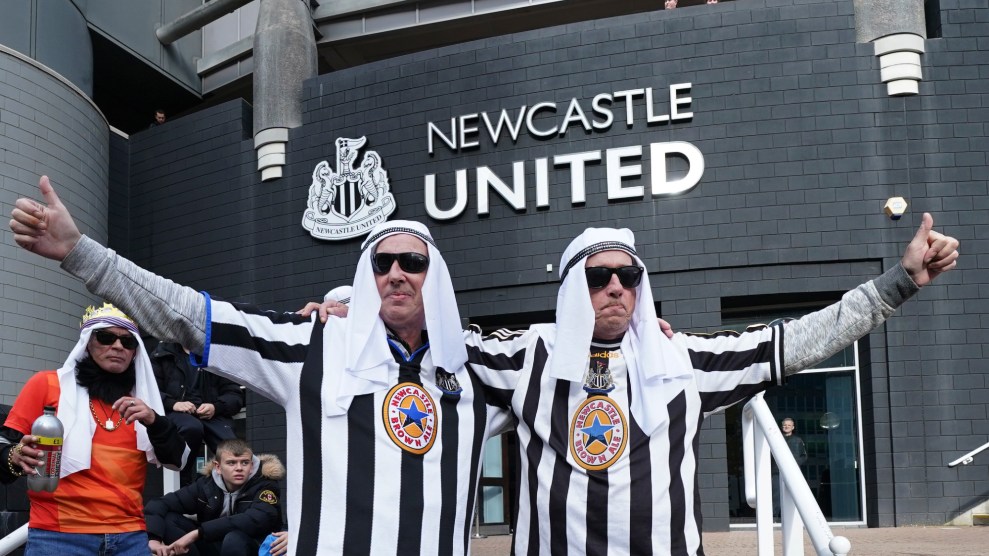
Jon Super / AP
LIV Golf advertises itself as “Golf but louder.” Since its debut last year, LIV (which is not an acronym; it’s a Roman numeral) has sought to take over the market from the PGA Tour by playing music over the loudspeakers during tournaments, shooting t-shirts into the crowd, cozying up to Donald Trump, and—mostly—paying famous golfers disgusting sums of money to compete at their events.
But unless you’re really into the idea of rock-and-roll golf, the story of LIV is the money behind it— the Public Investment Fund of Saudi Arabia, a nation that in recent years has used investments in international sporting events as a form of soft power. With nation-state backing, and a nation-state’s incentives, LIV can basically print money for as long as it wants, and the PGA views it as an existential threat. The PGA barred golfers who compete at LIV events from also competing at PGA events, and in response, 11 LIV golfers filed an antitrust lawsuit against the organization last August. In January, the PGA filed its own lawsuit against the PIF, seeking to depose the fund’s governor, Yasir al-Rumayyan, who is also a minister in the Saudi government. The PIF claimed that it and al-Rumayyan were protected by “sovereign immunity.” A judge sided with the PGA.
All of which is interesting even if you don’t really care about golf; the lawsuit over the Saudi state investment fund’s attempt to blow up an American sports monopoly could yield some pretty interesting stuff, and the LIV–PGA war has already taken on a pronounced political vibe. (Do you know who’s running comms for LIV? It’s Ari Fleischer!) But what’s really noteworthy about the “sovereign immunity” claim on behalf of the PIF and al-Rumayyan is that it’s seemingly the opposite of what the Saudis argued in 2021, when the PIF acquired a majority stake in the English soccer club Newcastle United.
Back then, the Premier League went to great lengths to assure critics that Newcastle would be wholly independent of any national entity. At the time the PIF made its first bid, as leaders of a consortium that also included the British investor Amanda Stavely, the Saudis were engaged in an economic blockade of Qatar, and the rival Gulf state lodged a formal complaint seeking to block the takeover. It accused Saudi Arabia of pirating Premier League broadcasts—for which the Qatari-owned network, beIN Sports, had spent half a billion dollars for the regional broadcast rights. The bid fell through. The Guardian reported at the time that the Premier League considered the PIF a part of the Saudi state, and it believed that the Saudi piracy of Premier League games therefore violated the league’s rules that prospective owners can’t participate in activities that would be illegal in the UK.
Saudi Arabia eventually got out of beIN’s way, and the consortium moved to buy the club again, but there was still the elephant in the room: The PIF is a sovereign wealth fund, and its chairman, Muhammed bin Salman is, well, the sovereign. And MBS is not just any head of state; according to the US government, he personally ordered the murder of a journalist, Jamal Khashoggi, in Turkey in 2018. His role, and his government’s horrific human rights record, was a major issue at the time.
But in the fall of 2021, the Premier League approved the sale with a surprising argument: It had received “legally binding assurances” from the ownership group, it claimed, that the Saudi state would not control the club. This was kind of a strange disclosure. The initial discussions for the bid had taken place on MBS’ megayacht. Just before the purchase had fallen through in 2020, MBS had lobbied UK Prime Minister Boris Johnson (via WhatsApp) to try to intervene on its behalf. And as Bloomberg had reported, MBS had taken a famously active role in the affairs of the PIF, which, again, the head-of-state presided over as chairman.
The takeover was cleared; the fans celebrated; Newcastle suddenly got very good; and the Saudi tourism board got a lot of sponsored content all of a sudden. But the LIV lawsuit has revived the ownership issue. Rival Premier League owners, and the human-rights organization Amnesty International, are demanding answers about the club where al-Rumayyan just happens to be chairman. When is a sovereign wealth fund not sovereign? The answer, it turns out, is simply when it’s convenient.













